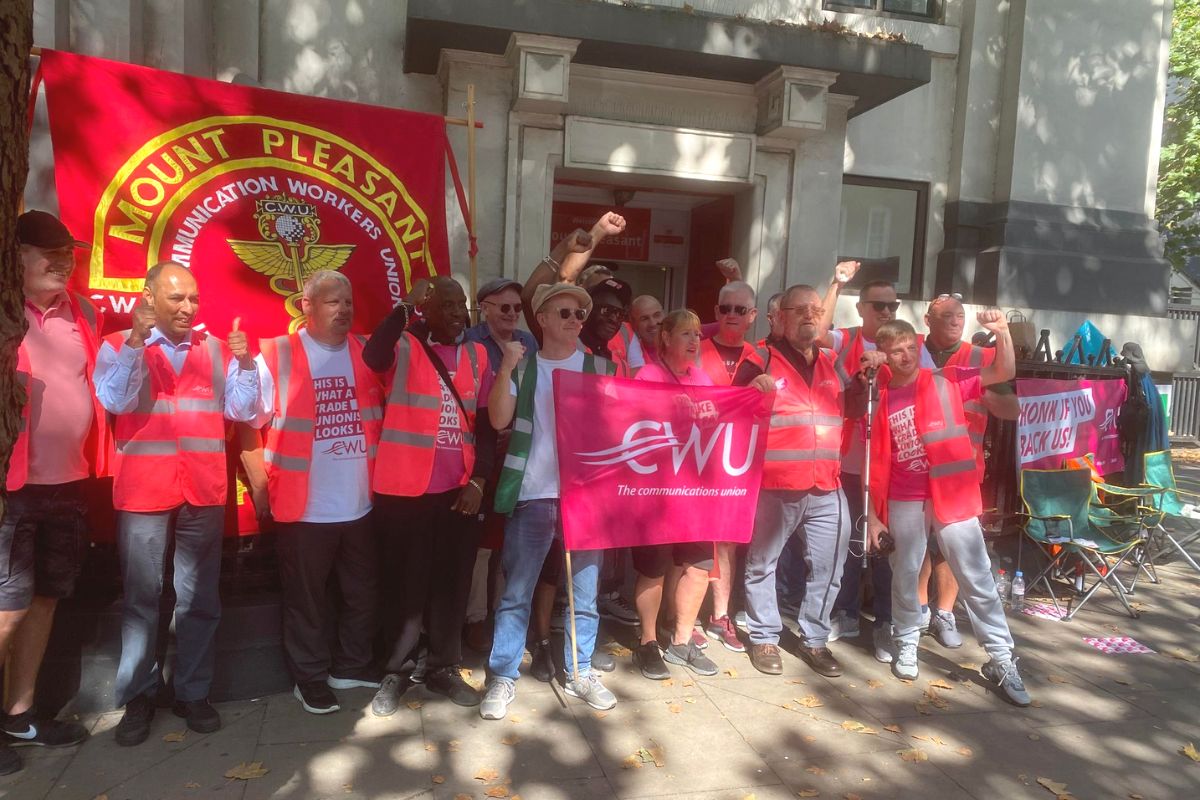This week saw further action by postal workers and telecoms workers in the CWU. This shows the way forward for the trade union movement: to unite the struggles with coordinated action against the bosses and their crisis-ridden system.
Yesterday, Wednesday 31 August, saw Royal Mail workers and BT Group workers – both organised in the Communication Workers’ Union (CWU) – out on strike at the same time.
Workers at these privatised companies are fighting similar disputes over pay, with the bosses proposing below-inflation wage rises, at a time when workers’ incomes are being squeezed ever tighter, whilst profits grow ever greater.
This move towards coordinated action marks an important – and welcome – development. The next step must be to unite the struggles further: not only amongst workers within one union, but between unions also, as part of a mass campaign to bring down the Tories and the bosses’ system.
Furthermore, especially given that both these companies were once nationalised, such a movement must be linked to the fight for public ownership, workers’ control, and socialist planning.
Socialist Appeal activists across the country have been attending local picket lines to show solidarity and support, and to discuss with striking workers about the way forward for the class struggle.
Newcastle
The Royal Mail picket line we visited in Newcastle had a good turnout. Morale was high, with cars going by honking in support.
Speaking to the postal workers, they told us about the degrading conditions in the workplace following the privatisation of Royal Mail, which have contributed to the huge support for strike action.
Such attacks on conditions include increased workloads within the same workday, and an unwillingness to hire new full-time staff – all of which the bosses refer to as ‘modernisation’.
There have also been constant attacks on incentive schemes, such as hitting delivery targets, or taking on specific jobs which, when taken away, represent a huge pay cut.
These workers know why they are out. They are aware of what is at stake. And they know what needs to be done. But they also don’t expect heaven and earth. They simply want a fair, inflation-based pay increase, without any strings attached.
View this post on Instagram
On top of this, workers spoke positively about coordinating struggles across the trade union movement, and even of the prospect of a general strike to kick out the Tories.
Notably, one of the picketers was critical of the TUC’s lack of real action during this time of heightened class struggle.
Later, a comrade attended a smaller picket in Cramlington that they had visited previously. Upon arrival, they were greeted warmly. A picketer immediately approached them to speak about the corrupt bosses, and how money has flowed out of the workers’ hands – and into those of the ruling class – during the pandemic.
Comrades will be out again on 8-9 September to support the CWU members in their continuing strike action, and to encourage anyone who can to do the same.
London
Comrades in London have attended picket lines across the city to show support for striking postal workers.
In Limehouse, east London, we spoke to Mickey, a CWU rep at the Royal Mail depot serving Poplar and the Isle of Dogs, with cars honking their horns in support throughout.
Mickey has worked for Royal Mail for 33 years. In this time, he has seen his pay and conditions steadily deteriorate – with an acceleration in the wake of privatisation.
All the while, he emphasised, the bosses – at Royal Mail, BT Group, and in all these privatised companies – have been “making criminal amounts of money”.
Combined with rising rents and house prices, he noted, the attack on wages has led to himself and other postal workers having to move out of the capital and commute long distances into work. Nevertheless, local CWU members had turned out in force for the picket.
But Mickey emphasised that the situation is the same for workers everywhere. “When even the barristers are having to come out on strike,” he stressed, “you know something is deeply wrong with the world of work in this country.”
“The working class – and that includes anyone below the CEOs – is being increasingly suppressed and exploited,” he continued, discussing the Tories’ anti-union threats.
“They don’t want us rising up. When you’re being continuously beaten, you eventually end up fighting back. And collective strike action is the only thing we’ve got left in our arsenal to defend ourselves.”
With Tory leadership candidates promising further attacks on the trade unions, Micky emphasised that Starmer’s Labour leadership has been little better.
“Where has Labour been in all of this?” he rhetorically asked. “How can a political party that’s supposed to represent working people come out against strikes? All these politicians are rotten.”
This shows the real militant mood amongst workers – not only at Royal Mail, but across the board. It is beholden on the trade union leaders to channel this anger into a mass movement that can overthrow the Tories and the entire bosses’ system.
Edinburgh
On Tuesday this week, comrades went to the picket line outside the postal office at Strathearn Road to support the postal strikers.
Members of the general public expressed their support, once they saw that there was a picket line. Similarly, groups such as the tenants’ union Living Rent attended in solidarity.
One of the workers had been working for more than 20 years as a postal worker. He said that this dispute with the management over pay, terms, and conditions was the most serious one he could remember.
This striker said that at the beginning of the pandemic, the company didn’t give workers PPE, even though he and his colleagues were working in a relatively small area sorting letters and packages.
He explained that all workers were disappointed with the management, given that they had worked tirelessly throughout the pandemic, and had got nothing back – no bonuses or pay rise. The company, meanwhile, reported record profits.
Isle of Wight

I was warmly greeted by the pickets at the Newport Royal Mail Depot on the Isle of Wight.
I managed to speak to everyone present, and our ideas were met with enthusiastic support – especially the prospect of a mass wave of strikes swelling towards general strike proportions.
As with the strikers at Red Funnel, those on the picket line – younger and older – readily agreed that workers’ control and management of industry was necessary, and that linking struggles together nationally is an important next step.
They said that they saw the company’s CEOs, shareholders, and most managers as parasitic, feeding on the efforts of workers. Royal Mail, they asserted, would work quite well without these creatures – better, in fact!
They are readily aware that profits are unpaid labour, and that inflation is not caused by workers’ wage demands.
We also discussed the cost-of living-crisis and the soaring price of energy – and again they could clearly see that private ownership is the source of our problems, and that the situation is crying out for the nationalisation of energy, rail, and water.
Loughborough

Three Socialist Appeal comrades joined around 40 striking postal workers at the Loughborough Royal Mail depot to support their struggle. Though the official dispute is about pay, the issues go much further.
What came across clearly on the picket line was that – despite the cost-of-living crisis – the workers were keen to point out this also wasn’t just about pay.
These are proud workers, who realise that the company is facing a race to the bottom in terms of competition with unregulated companies such as Amazon and DPD.
Attacks on conditions are wide-ranging and complicated. These have been eroded over decades. Start times have been pushed back bit by bit, for example, so that posties find themselves no longer able to pick up their kids from school, and are forced to pay for childcare instead.
Where before they could choose whether to take overtime if a delivery round was incomplete, now they have to finish and bank the time for the less busy summer period.
More parcel pickups; more factory-flat conversions; Sunday mandatory work days; reduced sick pay: it all adds up.
New workers already have many of these practices enforced on them. This creates a divide, as Royal Mail bosses try to push out older workers employed on better terms and conditions. Some have been there for 30 years or more.
But now quantity is turning into quality, and the posties are reaching boiling point. Just like others in rail, education, health, telecoms, these workers are saying ‘enough is enough!’
Some Royal Mail managers in Unite showed sympathy, refusing to work in solidarity. We were told that this was the only depot open in the region. And although there were some instances of crossing the picket line, this was mainly by agency and casualised workers.
There was also a growing realisation that this is a class war. Many workers were in agreement that, since the crisis is generalised throughout the economy, union leaders should come together to unite the struggles.
Liverpool

On Wednesday, Socialist Appeal supporters attended a CWU rally to show their support for the workers on strike. Over 100 people – including members of the UCU, GMB, Unison, and Unite – turned out in solidarity.
The mood at the rally was jubilant, with a small band of drummers keeping the crowds entertained before the speeches began.
Holidaymakers were even waving from a tour bus. In response, one of the CWU members gave an impromptu speech, welcoming them to socialist Liverpool and explaining the dispute.
Speakers included trade unionists and local MPs, including Ian Byrne (West Derby) and Kim Johnson MP (Riverside).
Kim was bold, stating that: “[The Labour Party] was born out of the trade union movement. [Starmer] needs to get his arse off the fence […] He needs to make a choice of whose side he is on: the workers or the companies.”
This resonated with the crowd, all of whom cheered at this scathing criticism of Starmer.
Also on the platform were CWU vice-president Jane Loftus, TUC regional secretary Jay McKenna, CWU regional secretary Carl Webb, and Mark O’Brien of the UCU.
Carl brought attention to the prospect of organising coordinated action in the future as a means of defeating the bosses, and he praised those from other unions who came to show solidarity.
Mark also brought a message of solidarity, thanking the CWU posties for not crossing the UCU picket line.
The most rousing speech was given by Jane Loftus. She highlighted how this is the first time she has seen the CWU come out together, with telecoms workers and posties striking together.
Jane was also critical of the right-wing Labour leadership, whilst highlighting the limits of the capitalist system: stating that capitalism is incapable of long-term planning, and that the bosses’ representatives in government are only motivated by short-term gain.
Jane’s closing remarks on the strength of the working class were empowering, cutting straight to the point: It is “[the workers who] make the profits […] If we stop work, things stop working!”






